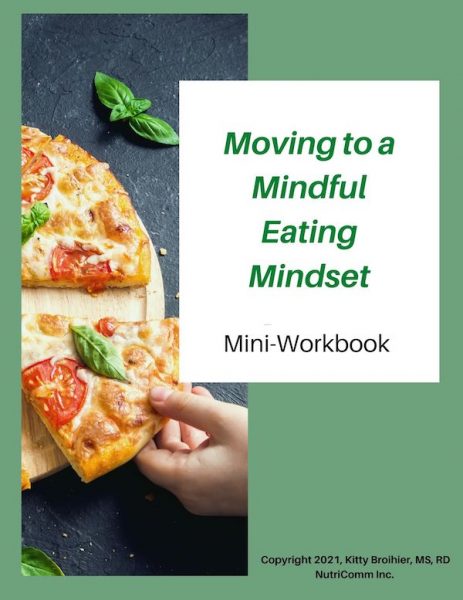Guest post by Kitty Broihier, one of my go-to registered dietitians for all things related to nutrition. In this post, she explains how to begin a practice of mindful eating.
I’ve previously discussed what mindful eating is, and the benefits of practicing mindful eating. This time, I’m covering the next step—how to get started bringing mindfulness into your eating behaviors. Beginning something new can feel daunting and strange, but mindful eating is something we were all born doing! This is about reconnecting to that innate skill. And I’m here to help, so let’s dig in.
Starting fresh
When you’re trying to change your eating habits, it’s very tempting to just jump right in with the behavior and environmental aspects—you know, doing all those typical diet things like clearing out all the fun foods from your cabinets and buying protein powder for your new morning smoothie routine. I know it feels good to be able to make a big, obvious change that signals a “fresh start.” However, if that process really worked, would you be back here starting all over again? So, I’m going to ask you to take a different approach this time. Remember, mindful eating is not about getting to the goal the fastest, but instead about shifting to a sustainable and enjoyable way of eating that supports your health. Sometimes the most powerful shifts are also the most subtle.
Your mindset is key
So, what we’re going to start with is your mindset. The truth is, if your mindset isn’t in the right place to make changes, you’ll be fighting yourself the whole way. Moving your eating habits from “mind-less” to “mind-full” relies largely on what’s going on inside your brain, where emotions, thoughts and memories mingle and find their way out into your habits. Skipping the mental part of the process discounts the importance of your background and your eating history. Mindset is foundational to truly making lasting behavioral changes, and success (however you want to define it) will be easier when your body and your mind are aligned.
Getting to the roots of your behaviors
Now, I’m not a therapist, and I don’t pretend to be one, but there’s no denying that the way we eat as adults is influenced by the history we each have with food and eating. Sometimes there is trauma around these topics that carries influence throughout your life. If this is your situation, it’s important to get personal, professional help. For many people though, thinking back on childhood eating habits helps pinpoint when habits started forming, or when things began to veer off track. It can also help identify the reasons—the roots—that are buried beneath these habits. Perhaps there were family attitudes about food or bodies that you learned as a child and have carried into adulthood? Maybe your go-to weight-loss behaviors started in your teenage years (or younger) in response to a particular event? The “inside work” related to eating habits may be very significant. It pays to at least take a look at your eating and dieting history.
What you can do now to get started
Although shifting your mindset seems like it might be complicated, I’m confident that if you take a week or two to work through the suggestions below, you’ll be in a better place to make actual progress, instead of just slapping on another diet “bandage” and hoping for the best. And, you can start at any time—on your own—today, even!
- Read about mindful eating (here’s a good place to start and here).
- Investigate the concept of “diet culture” and consider finding a dietitian who uses a non-dieting approach to nutrition counseling.
- Start keeping track of times when you felt out of control around food or felt trapped in your eating habits. You can keep track in the Notes app on your phone or in a little notebook. Just briefly jot down
- What preceded these occasions? (Was it a stressful workday, a fight with your spouse, an emotional situation, etc.?)
- What did your eating behavior look like? (Did you binge on one specific food, eat more than you intended for a meal, skip a meal and then eat snack foods at night, etc.?)
- How did you feel afterward?
- Reflect on why you are choosing to start changing your eating habits. What’s the situation you wish to modify? Is it really about weight loss and your body or something deeper?
- Determine your current “diet mentality.” Think about your current eating behaviors and their consequences. How much of your life have you spent dieting, thinking about dieting, feeling regret or shame about your eating? Are these behaviors and behaviors the way you want to continue to live?
- Form a vision of what you want. Starting something new has its own rewards certainly, but having a vision of how you’d like your experience to play out, or how you want to feel while learning can be a helpful focus point as you move forward. The “prize” you want to keep your eye on doesn’t have to be physical; it can be an attitude of freedom around food or ease with your body, for example. Envision what life will be like once you have mindful eating habits and aren’t trapped by food restriction or binge eating.
Intrigued? Grab this free workbook and get started!
If you’ve read this far, I’m betting that you are seriously considering changing your relationship with food, dieting, and your body. I know how mentally freeing and enjoyable it is to be a mindful eater (and how impactful it can be for modifying eating habits). I want to share the goodness with you! So, to help you get started shifting your mindset, I created a brand new, 10-page workbook called Moving to a Mindful Eating Mindset. Send me an email and I’ll see that you get access to the workbook. Again, this workbook is absolutely free and there is no obligation to purchase anything.
Note from Diane
I just read Kitty’s Moving to a Mindful Eating Mindset workbook. I think it’s a great start for anyone who wants to take a serious look at their eating habits and their relationship with food and with their body. If you decide now is your time to learn about and practice mindful eating, good for you! There’s nothing like the present moment. Check out Kitty’s website and Facebook page for more information.



Leave A Comment